
EARTH AND PLANETARY SCIENCE LETTERS
Scope & Guideline
Exploring the Depths of Our Planet and Beyond
Introduction
Aims and Scopes
- Earth and Planetary Processes:
The journal emphasizes research that elucidates the processes governing the evolution of Earth and other planetary bodies, including tectonics, volcanism, and sedimentation. - Geochemical and Isotopic Studies:
There is a strong focus on the application of geochemistry and isotopic analyses to investigate planetary formation, evolution, and interactions between geological processes and biological systems. - Climate and Environmental Change:
Research exploring the impacts of climate change on geological and environmental processes, including sediment transport, erosion, and biogeochemical cycles, is a core theme. - Geophysical Investigations:
The journal publishes studies employing geophysical techniques to probe the internal structure and dynamics of Earth and planetary bodies, including seismic imaging and tomographic studies. - Interdisciplinary Approaches:
Encouraging interdisciplinary research that integrates geology, geophysics, geochemistry, and environmental science to address complex Earth and planetary problems.
Trending and Emerging
- Climate Impact Studies:
Research examining the impacts of climate change on geological processes, including erosion, sediment transport, and hydrological cycles, is increasingly prominent. - Planetary Science and Astrobiology:
There is a growing trend towards studies related to planetary science, particularly concerning the geological and atmospheric evolution of Mars and other celestial bodies. - Geochemical Cycling and Environmental Change:
Emerging research focuses on the geochemical cycling of elements and its implications for environmental change, including the interactions between biosphere and geosphere. - Advanced Analytical Techniques:
The use of cutting-edge techniques such as machine learning, high-resolution isotopic analysis, and remote sensing is on the rise, facilitating new insights into geological processes. - Geohazards and Natural Disasters:
An increase in studies related to geohazards, including earthquake dynamics, volcanic eruptions, and their societal impacts, is evident, reflecting heightened societal concerns.
Declining or Waning
- Traditional Geology Studies:
There seems to be a gradual decline in papers focused solely on traditional geological mapping and stratigraphy, as the field shifts towards more integrative and quantitative approaches. - Paleoecological Research:
Research centered on paleoecology and biostratigraphy has decreased, possibly overshadowed by more dynamic studies focusing on current climate impacts and geochemical cycles. - Regional Studies:
Specific regional studies that do not apply broader geophysical or geochemical frameworks appear to be less frequent, indicating a trend towards more global or systemic approaches.
Similar Journals

Journal of Advances in Modeling Earth Systems
Empowering Global Collaboration in Earth System Modeling.Journal of Advances in Modeling Earth Systems, published by the American Geophysical Union, is a foremost open access journal that has been contributing to the fields of Earth and Planetary Sciences, Environmental Chemistry, and Global and Planetary Change since its inception in 2009. With a remarkable impact factor and consistently maintained Q1 category rankings across several key disciplines, this journal stands out as a leading platform for disseminating innovative research and modeling advancements critical to understanding Earth systems. It is ranked in the top 5% of Earth and Planetary Sciences and Environmental Chemistry, emphasizing the high caliber of work published within its pages. The journal engages a diverse audience, including researchers, professionals, and students, by providing a comprehensive repository of cutting-edge studies and findings that are openly accessible to the global scientific community. With its headquarters in the United States and converging research from 2011 to 2024, the Journal of Advances in Modeling Earth Systems remains an essential resource for those seeking to explore and advance the frontiers of environmental science and modeling techniques.

GEOCHEMISTRY INTERNATIONAL
Exploring the Depths of Earth's ChemistryGEOCHEMISTRY INTERNATIONAL, an esteemed journal published by MAIK NAUKA/INTERPERIODICA/SPRINGER, serves as a vital platform for researchers in the fields of geochemistry, petrology, and geophysics. With a deep history reaching back to its inception, the journal spans significant converged years from 1977 to 1978 and continues its publication through 2024. Although it currently does not offer Open Access options, its scholarly impact is underscored by an established reputation indicated by its Q3 categorization in both Geochemistry and Petrology and Geophysics for 2023. Researchers can leverage this platform to disseminate groundbreaking findings and engage with contemporary discussions in Earth and planetary sciences, where it ranks at the 39th and 32nd percentiles within its respective categories. The journal is an essential resource for professionals, students, and scholars seeking to deepen their understanding of geochemical processes and evolve scientific discourse within this dynamic field.
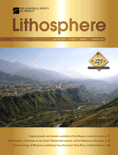
Lithosphere
Transforming Geological Insights into Global Impact.Lithosphere, published by GEOSCIENCEWORLD, is a premier open access journal that has been at the forefront of geological research since its inception. With the ISSN 1941-8264 and the E-ISSN 1947-4253, this journal serves as a vital resource for researchers, professionals, and students interested in Earth and planetary sciences, particularly in the field of geology. Its impressive ranking of Q2 in the 2023 category indicates its vital role in disseminating high-quality, impactful research. The journal’s commitment to open access since 2018 enhances its reach, providing global accessibility to cutting-edge studies that span a diverse range of geoscientific topics, from tectonics to sedimentology. With Scopus Rank #88 out of 321 in Earth and Planetary Sciences, it offers a strong platform for scholars to share their findings and engage with the latest advancements in the discipline. As the journal continues its convergence from 2009 to 2024, Lithosphere remains a crucial publication for those striving to deepen their understanding of Earth's systems.
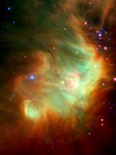
Annual Review of Earth and Planetary Sciences
Advancing Knowledge in Earth and Planetary SciencesAnnual Review of Earth and Planetary Sciences is a leading scholarly journal published by Annual Reviews, dedicated to advancing our understanding of the dynamic processes governing the Earth and its celestial companions. With ISSN 0084-6597 and E-ISSN 1545-4495, this esteemed journal, established in 1976, has consistently provided comprehensive reviews that synthesize cutting-edge research across various disciplines, including astronomy, astrobiology, geology, and planetary science. Notably, the journal has achieved a remarkable position in the academic landscape, ranking in the Q1 quartile across multiple categories, including Astronomy and Astrophysics and Earth and Planetary Sciences, with Scopus rankings placing it at the forefront of these fields. The journal's commitment to facilitating open access to critical scientific advances, though not fully open, allows for maximum reach within the research community. Researchers, professionals, and students alike can benefit from the high-impact articles designed to foster collaboration and innovation within the fields of earth and planetary science.

Geochemical Perspectives Letters
Connecting researchers through groundbreaking geochemical research.Geochemical Perspectives Letters, published by the European Association of Geochemistry, is a leading open-access journal that has been at the forefront of geochemical research since its inception in 2015. Based in France, this journal is dedicated to disseminating high-quality, original research and reviews across the fields of Environmental Chemistry, Geochemistry, and Petrology, and Geology. With an impressive Q1 ranking in multiple categories, and notable Scopus rankings placing it among the top-tier journals in Earth Sciences, Geochemical Perspectives Letters aims to foster scientific dialogue and collaboration among researchers and professionals. Its open-access model ensures widespread dissemination of knowledge, making it accessible to a diverse audience, including students and seasoned experts alike. As the journal continues to converge research insights from 2015 to 2024, it remains a pivotal resource for those striving to understand and address the complexities of our planet's geochemical processes.

EARTH PLANETS AND SPACE
Pioneering Research in Earth and Space SciencesEARTH PLANETS AND SPACE, published by Springer and based in Switzerland, is a distinguished journal that plays a pivotal role in advancing the fields of Earth and planetary sciences. With an impactful presence in both geology (Q1) and space and planetary science (Q2), this journal is increasingly recognized for its contributions to understanding complex geoscientific processes and extraterrestrial phenomena. The journal has been a vital resource for researchers since its inception in 1996 and is anticipated to continue this legacy until at least 2024. It ranks impressively within the Scopus database, holding the 53rd position out of 321 in Earth and Planetary Sciences for Geology and the 30th position out of 104 for Space and Planetary Science, reflecting a robust percentile standing of 83 and 71, respectively. With open access options available, EARTH PLANETS AND SPACE makes cutting-edge research more accessible to a global audience, fostering collaboration and innovation. This journal is essential for anyone seeking to deepen their knowledge or stay current with trends in Earth sciences and planetary exploration.
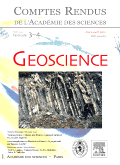
COMPTES RENDUS GEOSCIENCE
Innovating Insights into Planetary Change.COMPTES RENDUS GEOSCIENCE, an esteemed open-access journal published by ACAD SCIENCES since 2020, serves as a vital platform for disseminating significant research in the field of Earth and Planetary Sciences. With an ISSN of 1631-0713 and E-ISSN of 1778-7025, this French journal is located at 23 Quai de Conti, Paris, 75006, France. Focusing on various sub-disciplines, it is recognized in the 2023 category quartiles as Q2 in Earth and Planetary Sciences (miscellaneous) and Q3 in Global and Planetary Change. The journal ranks #82 out of 195 in Earth and Planetary Sciences and #79 out of 120 in Environmental Science, reflecting its commitment to quality scholarship and impactful research. The journal's open-access model enhances accessibility, ensuring that researchers, professionals, and students alike can freely engage with cutting-edge findings that contribute to a deeper understanding of our planet and its systems. The ongoing convergence of knowledge from 2002 to 2024 positions COMPTES RENDUS GEOSCIENCE as a crucial resource in the evolving landscape of geosciences.
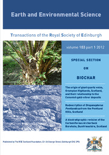
Earth and Environmental Science Transactions of the Royal Society of Edinburgh
Innovating solutions to global environmental challenges.Earth and Environmental Science Transactions of the Royal Society of Edinburgh is a prestigious journal published by Cambridge University Press, dedicated to advancing research in the field of Earth and planetary sciences, as well as environmental science. With its ISSN 1755-6910 and E-ISSN 1755-6929, the journal has established itself as a crucial platform for disseminating innovative research and comprehensive reviews since its inception in 2007. Positioned in the Q3 quartile for both Earth and Planetary Sciences and Environmental Science, it contributes significantly to the ongoing dialogue and development in these areas, boasting a Scopus ranking that reflects its commitment to scholarly excellence with an emphasis on interdisciplinary approaches and real-world applications. The journal is based in the United Kingdom, with its editorial office located at the Edinburgh Building, Shaftesbury Road, Cambridge. As an essential resource for researchers, professionals, and students alike, Earth and Environmental Science Transactions offers opportunities for open discourse on pressing environmental challenges, fortifying its role in fostering a deeper understanding of our planet's systems and their interconnectedness.
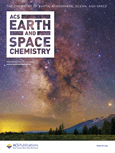
ACS Earth and Space Chemistry
Pioneering Research in Atmospheric and Planetary SciencesACS Earth and Space Chemistry is a leading journal published by the American Chemical Society, dedicated to advancing the interdisciplinary fields of atmospheric science, geochemistry, and planetary science. Since its inception in 2017, this journal has quickly established itself as a pivotal resource for researchers and professionals, boasting an impressive impact factor and securing its position in Q2 of the Scopus rankings for 2023 across its relevant categories. The journal publishes cutting-edge research articles, reviews, and commentaries that explore the chemical processes influencing Earth and space environments. By providing open access to invaluable research from experts around the globe, it encourages collaboration and dissemination of knowledge, crucial for addressing pressing environmental and planetary challenges. Situated in the heart of Washington, D.C., the journal's editorial office works diligently to ensure rigorous peer review and high-quality publications that meet the needs of its diverse audience, including scholars and students keen to stay abreast of developments in these dynamic fields.
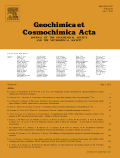
GEOCHIMICA ET COSMOCHIMICA ACTA
Elevating Scientific Discourse in Geochemistry and PetrologyGEOCHIMICA ET COSMOCHIMICA ACTA is a premier journal dedicated to advancing the fields of geochemistry and petrology, published by Pergamon-Elsevier Science Ltd. With its ISSN 0016-7037 and E-ISSN 1872-9533, this esteemed journal has been at the forefront of scientific inquiry since its inception in 1950, with a strong commitment to disseminating high-quality research through 2024. Its reputation is underscored by an impressive impact factor and a ranking of #8 out of 154 in Earth and Planetary Sciences according to Scopus, placing it in the 95th percentile of its category. GEOCHIMICA ET COSMOCHIMICA ACTA serves as a critical resource for researchers, professionals, and students alike, offering insights into the complex interactions of geological and cosmological processes. While the journal is not open access, it remains a vital conduit for innovative research, fostering the scientific community’s understanding of earth materials and their significance.